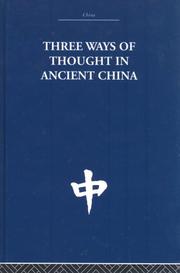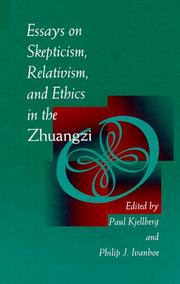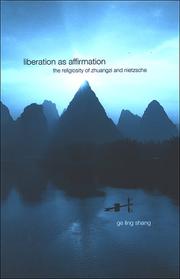| Listing 1 - 10 of 20 | << page >> |
Sort by
|

ISBN: 1283846195 1135651965 0203715322 9781135651961 9780203715321 9781135652036 9781135652104 9780415361804 9780415612807 1135652031 Year: 2012 Publisher: Hoboken Taylor and Francis
Abstract | Keywords | Export | Availability | Bookmark
 Loading...
Loading...Choose an application
- Reference Manager
- EndNote
- RefWorks (Direct export to RefWorks)
First published in 1939. This book consists chiefly of extracts from Chuang Tzu, Mencius and Han Fei Tzu. Chuang Tzu's appeal is to the imagination; the appeal of mencius is to the moral feelings; realism, as expounded by Han Fei Tzu, finds a close parallel in modern Totalitarianism and as a result these extracts from a book of the third century B.C. nonetheless have a very contemporary connection.
Philosophy, Chinese. --- Philosophy. --- Mental philosophy --- Humanities --- Chinese philosophy --- Mencius. --- Zhuangzi. --- Chuang Tzu --- Chwang Tszĕ --- Dschuang Dsi --- Tchouang-Tseu --- Tschuang-tse --- Tsjwang-Tze --- Tswang Tse --- Mencius
Book
ISBN: 0231536518 9780231536516 9780231165044 0231165048 1322374287 Year: 2014 Publisher: New York
Abstract | Keywords | Export | Availability | Bookmark
 Loading...
Loading...Choose an application
- Reference Manager
- EndNote
- RefWorks (Direct export to RefWorks)
The early Chinese text Master Zhuang (Zhuangzi) is well known for its relativistic philosophy and colorful anecdotes. In the work, Zhuang Zhou ca. 300 B.C.E.) dreams that he is a butterfly and wonders, upon awaking, if he in fact dreamed that he was a butterfly or if the butterfly is now dreaming that it is Zhuang Zhou. The text also recounts Master Zhuang's encounter with a skull, which praises the pleasures of death over the toil of living. This anecdote became popular with Chinese poets of the second and third century C.E. and found renewed significance with the founders of Quanzhen Daoism in the twelfth century.The Quanzhen masters transformed the skull into a skeleton and treated the object as a metonym for death and a symbol of the refusal of enlightenment. Later preachers made further revisions, adding Master Zhuang's resurrection of the skeleton, a series of accusations made by the skeleton against the philosopher, and the enlightenment of the magistrate who judges their case. The legend of the skeleton was widely popular throughout the Ming dynasty (1368-1644), and the fiction writer Lu Xun (1881-1936) reimagined it in the modern era. The first book in English to trace the development of the legend and its relationship to centuries of change in Chinese philosophy and culture, The Resurrected Skeleton translates and contextualizes the story's major adaptations and draws parallels with the Muslim legend of Jesus's encounter with a skull and the European tradition of the Dance of Death. Translated works include versions of the legend in the form of popular ballads and plays, together with Lu Xun's short story of the 1930s, underlining the continuity between traditional and modern Chinese culture.
Chinese literature --- Resurrection in literature. --- History and criticism. --- Zhuangzi --- Chuang Tzu --- Chwang Tszĕ --- Dschuang Dsi --- Tchouang-Tseu --- Tschuang-tse --- Tsjwang-Tze --- Tswang Tse --- In literature.
Book
ISBN: 9781350124325 135012432X 9781350124318 1350124311 Year: 2021 Publisher: London Bloomsbury Academic
Abstract | Keywords | Export | Availability | Bookmark
 Loading...
Loading...Choose an application
- Reference Manager
- EndNote
- RefWorks (Direct export to RefWorks)
"The Zhuangzi is one of China's greatest literary and philosophical masterpieces, yet its complexities make it a challenging read. This English translation leads you confidently through the comic scenes and virtuoso writing style, introducing all the little stories Zhuangzi invented and unpicking its philosophy through close commentaries and helpful asides. In Graziani's translation, the co-founder of Daoism emerges as a remarkable thinker. It is a must-read for anyone coming to Chinese philosophy or the Zhuangzi for the first time, and one that reminds us of the importance of thinking beyond our limited, everyday perspectives"--
Philosophy, Chinese --- Zhuangzi. --- Chuang Tzu --- Chwang Tszĕ --- Dschuang Dsi --- Tchouang-Tseu --- Tschuang-tse --- Tsjwang-Tze --- Tswang Tse --- S12/0600 --- China: Philosophy and Classics--Zhuangzi
Book
ISBN: 1438474830 1438474849 9781438474847 9781438474830 1438474822 Year: 2019 Publisher: Albany
Abstract | Keywords | Export | Availability | Bookmark
 Loading...
Loading...Choose an application
- Reference Manager
- EndNote
- RefWorks (Direct export to RefWorks)
In recent decades, a growing concern in studies in Chinese intellectual history is that Chinese classics have been forced into systems of classification prevalent in Western philosophy and thus imperceptibly transformed into examples that echo Western philosophy. Lin Ma and Jaap van Brakel offer a methodology to counter this approach, and illustrate their method by carrying out a transcultural inquiry into the complexities involved in understanding shi and fei and their cognate phrases in the Warring States texts, the Zhuangzi in particular. The authors discuss important features of Zhuangzi's stance with regard to language-meaning, knowledge-doubt, questioning, equalizing, and his well-known deconstruction of the discourse in ancient China on shifei. Ma and van Brakel suggest that shi and fei apply to both descriptive and prescriptive languages and do not presuppose any fact/value dichotomy, and thus cannot be translated as either true/false or right/wrong. Instead, shi and fei can be grasped in terms of a pre-philosophical notion of fitting. Ma and van Brakel also highlight Zhuangzi's idea of "walking-two-roads" as the most significant component of his stance. In addition, they argue that all of Zhuangzi's positive recommendations are presented in a language whose meaning is not fixed and that every stance he is committed to remains subject to fundamental questioning as a way of life.
Methodology. --- Philosophy, Comparative. --- Zhuangzi. --- Comparative philosophy --- Humanities Methodology --- Methodology --- Chuang Tzu --- Chwang Tszĕ --- Dschuang Dsi --- Tchouang-Tseu --- Tschuang-tse --- Tsjwang-Tze --- Tswang Tse
Book
ISBN: 2070779963 9782070779963 Year: 2006 Publisher: Paris Gallimard
Abstract | Keywords | Export | Availability | Bookmark
 Loading...
Loading...Choose an application
- Reference Manager
- EndNote
- RefWorks (Direct export to RefWorks)
Philosophy, Chinese --- Zhuangzi --- S12/0600 --- China: Philosophy and Classics--Zhuangzi --- Zhuangzi. --- Chuang Tzu --- Chwang Tszĕ --- Dschuang Dsi --- Tchouang-Tseu --- Tschuang-tse --- Tsjwang-Tze --- Tswang Tse --- Philosophy, Chinese - To 221 B.C

ISBN: 0824808363 Year: 1983 Publisher: Honolulu University of Hawaii press
Abstract | Keywords | Export | Availability | Bookmark
 Loading...
Loading...Choose an application
- Reference Manager
- EndNote
- RefWorks (Direct export to RefWorks)
S12/0600 --- #SML: Joseph Spae --- China: Philosophy and Classics--Zhuangzi --- Zhuangzi --- Chuang Tzu --- Chwang Tszĕ --- Dschuang Dsi --- Tchouang-Tseu --- Tschuang-tse --- Tsjwang-Tze --- Tswang Tse --- Zhuangzi. --- 莊子. --- Chuang-tzu.

ISBN: 0791428915 0791428923 Year: 1996 Publisher: Albany State university of New York press
Abstract | Keywords | Export | Availability | Bookmark
 Loading...
Loading...Choose an application
- Reference Manager
- EndNote
- RefWorks (Direct export to RefWorks)
Skepticism. --- Zhuangzi. --- Skepticism --- S12/0600 --- Scepticism --- Unbelief --- Agnosticism --- Belief and doubt --- Free thought --- China: Philosophy and Classics--Zhuangzi --- Chuang Tzu --- Chwang Tszĕ --- Dschuang Dsi --- Tchouang-Tseu --- Tschuang-tse --- Tsjwang-Tze --- Tswang Tse
Book
ISBN: 1438462867 9781438462868 9781438462851 1438462859 9781438462844 Year: 2016 Publisher: Albany : State University of New York Press,
Abstract | Keywords | Export | Availability | Bookmark
 Loading...
Loading...Choose an application
- Reference Manager
- EndNote
- RefWorks (Direct export to RefWorks)
The Daoist Zhuangzi has often been read as a mystical philosopher. But there is another tradition, beginning with the Han dynasty historian Sima Qian, which sees him as a critic of the Confucians. Kim-chong Chong analyzes the Inner Chapters of the Zhuangzi, demonstrating how Zhuangzi criticized the pre-Qin Confucians through metaphorical inversion and parody. This is indicated by the subtitle, "Blinded by the Human," which is an inversion of the Confucian philosopher Xunzi's remark that Zhuangzi was "blinded by heaven and did not know the human. " Chong compares Zhuangzi's Daoist thought to Confucianism, as exemplified by Confucius, Mencius, and Xunzi. By analyzing and comparing the different implications of concepts such as "heaven," "heart-mind," and "transformation," Chong shows how Zhuangzi can be said to provide the resources for a more pluralistic and liberal philosophy than the Confucians.
Philosophy, Confucian. --- Confucian philosophy --- Confucianism --- Philosophy, Chinese --- Zhuangzi. --- Chuang Tzu --- Chwang Tszĕ --- Dschuang Dsi --- Tchouang-Tseu --- Tschuang-tse --- Tsjwang-Tze --- Tswang Tse --- Philosophy, Confucian --- S12/0600 --- China: Philosophy and Classics--Zhuangzi
Book
ISBN: 9782809702194 Year: 2010 Publisher: Arles Picquier
Abstract | Keywords | Export | Availability | Bookmark
 Loading...
Loading...Choose an application
- Reference Manager
- EndNote
- RefWorks (Direct export to RefWorks)
Philosophy, Chinese --- Taoist philosophy --- S12/0600 --- Philosophy, Taoist --- Philosophy --- Chinese philosophy --- China: Philosophy and Classics--Zhuangzi --- Zhuangzi. --- Chuang Tzu --- Chwang Tszĕ --- Dschuang Dsi --- Tchouang-Tseu --- Tschuang-tse --- Tsjwang-Tze --- Tswang Tse --- Taoist philosophy. --- Philosophy, Chinese.

ISBN: 0791482243 1423772881 9781423772880 0791466671 9780791466674 9780791482247 9780791482247 9780791466681 Year: 2006 Publisher: Albany State University of New York Press
Abstract | Keywords | Export | Availability | Bookmark
 Loading...
Loading...Choose an application
- Reference Manager
- EndNote
- RefWorks (Direct export to RefWorks)
Uses the concept of religiosity to challenge traditional views of Nietzsche and Zhuangzi as nihilistic and anti-religious.
Philosophy, Comparative. --- Philosophy. --- Taoist philosophy. --- Comparative philosophy --- Mental philosophy --- Humanities --- Philosophy, Taoist --- Philosophy --- Nietzsche, Friedrich Wilhelm, --- Zhuangzi. --- Nietzsche, Friedrich --- Nietzsche, Friederich --- Chuang Tzu --- Chwang Tszĕ --- Dschuang Dsi --- Tchouang-Tseu --- Tschuang-tse --- Tsjwang-Tze --- Tswang Tse --- S12/0820 --- S12/0600 --- China: Philosophy and Classics--Comparative philosophy --- China: Philosophy and Classics--Zhuangzi
| Listing 1 - 10 of 20 | << page >> |
Sort by
|

 Search
Search Feedback
Feedback About UniCat
About UniCat  Help
Help News
News